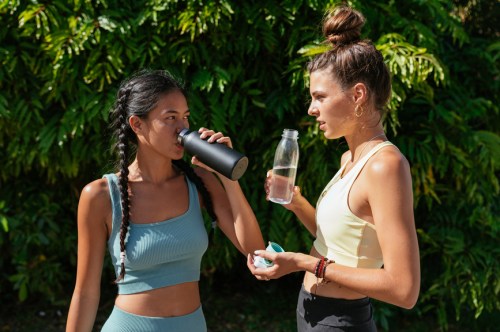One of the most glorious parts of the summer is any long, sunny day spent hanging at the beach or spending time at a lake. Some of my fondest memories are of throwing on a sweatshirt and shorts over my (mostly) dry bathing suit and running back out to catch a bonfire with friends. Whether it was because I was in a hurry or because I didn’t want to peel off my suit and scratch my newly-acquired sunburn, that suit was staying put.
Experts in This Article
urology and women’s health specialist at Aeroflow Urology
Gynecologic Surgeon | Urogynecologist
Female Pelvic Medicine and Reconstructive Surgery Associate Fellowship Director
Associate Obstetrics & Gynecology clerkship director, Harvard Medical School
Assistant Professor of Obstetrics, Gynecology and Reproductive Biology, Harvard Medical School
The downside to this inevitable summer scenario for people with vulvas, however, is the high risk of contracting a urinary tract infection (UTI). Unfortunately, that painful, pesky, day-ruining sting when you pee is more likely to in the summer for a whole host of reasons.
To protect your summer days from the pain and strife of a UTI, we asked experts break down exactly why this happens more frequently this season and what you can do to prevent it.
What causes UTIs
First off, in case you were wondering what a UTI even is, let’s break that down. According to Aleece Fosnight, MSPAS, PA-C, CSC-S, CSE, NCMP, IF, urologist and women’s health specialist of Aeroflow Urology, a UTI is when infectious bacteria make their way into the urethra and multiply. There are a few different strains of UTI-causing bacteria (like E. Coli), which typically comes from in and around your anus, and others that originate from wet bathing suits, foreign bodies of freshwater, and more.
The most common advice practitioners like Dr. Fosnight typically have for these infections is to wipe your vulva from front to back when you go to the bathroom, pee after sex, cleanse the area in the shower with water or water and a gentle cleanser, and, most importantly, stay hydrated.
Why UTIs are more common in the summer and how to prevent summer UTIS
This last point—hydration—is actually one of the key reasons why UTIs are so common in the summer, says Dr. Fosnight. Everyone’s daily requirement for water is different, but she recommends getting at least 60 ounces per day.
“One should really try to prevent dehydration as much as possible,” Dr. Fosnight says. “It’s much easier to prevent dehydration than to solve it when it occurs.” This means that you should try to drink water when you wake up and before you head out into the sun for activities, she adds. According to Dr. Fosnight, hydration is a pivotal of UTI prevention because it affects the moisture levels of your vulva, how you pee, and the levels of bacteria involved in both. “For example, peeing flushes the urethra and forces out unwanted bacteria. If you’re not drinking enough water, you’re not going to be peeing, and this leads to a heightened UTI risk,” she says.
The other culprit for the summer sting of UTIs is hanging out in wet bathing suits. “While bathing suits don’t directly cause UTIs, the dark, wet, non-absorbent materials do create the environment for unwanted bacteria to thrive,” says Emily Von Bargen, DO, gynecologic surgeon, urogynecologist, and medical advisor to Cheeky Bonsai.
The goal, according to Dr. Fosnight, is to minimize this period of contact as much as possible—which means changing out of your suit if you’re not going to swim or have been out for 30 or more minutes. Bathing suits are actually made to protect your body from the elements while you swim, so they’re definitely not something to avoid. “It’s simply wearing a wet, non-breathable material over the vulva for a while in combination with potential dehydration that heightens the risk,” she says.
Getting a UTI in the summer is honestly about having a lot of different cards stacked against you. Alcohol, for instance, doesn’t directly cause a UTI, but Dr. Von Bargen explains that this also contributes to dehydration as well.
To ensure you can have the most fun and least bacteria sneaking into your urethra this summer, make sure to stay on top of your water and pack extra dry cotton underwear per our experts’ orders.
Sign Up for Our Daily Newsletter
Get all the latest in wellness, trends, food, fitness, beauty, and more delivered right to your inbox.
Got it, you've been added to our email list.











